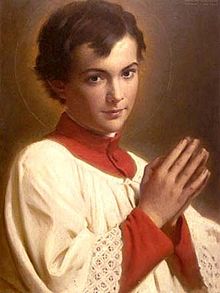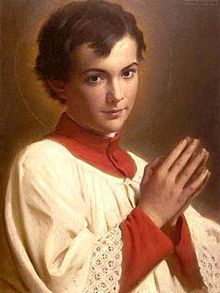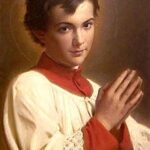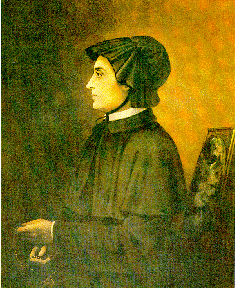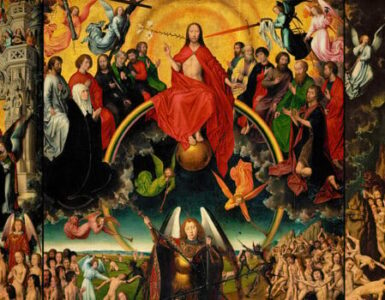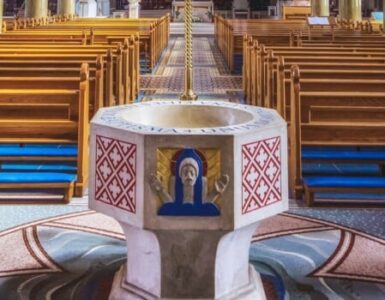Archbishop Fulton J. Sheen once said that “it does not take much time to make us saints – – it takes only much love.” A person can become a saint at any age, even a very young age. Saint Dominic Savio is one of the young saints of the Church. He only lived to be fourteen years old, yet he continues to inspire people many years after his death because of his great example of holiness.
Dominic Savio was born on April 2, 1842 in Riva di Chieri, Italy to faithful Catholic parents. His father was a blacksmith and carpenter and his mother was a seamstress; Dominic was one of ten children. Dominic was a very devout child and began serving Mass at age five. He had great devotion to Jesus in the Blessed Sacrament, and by age seven, was ready to receive his First Holy Communion, even though children at that time did not usually receive Holy Communion until they were about twelve years old. His parish priest allowed him to do so because of his great faith, knowledge of Church teachings, and great desire to receive the Eucharist. On the day of his First Communion, Dominic made the following resolutions:
1. I will go to Confession often, and as frequently to Holy Communion as my confessor allows.
2. I wish to sanctify the Sundays and festivals in a special manner.
3. My friends shall be Jesus and Mary.
4. Death rather than sin.
Saint John Bosco wrote in his biography of Dominic: “These resolutions were not simply written out and then put carefully away; he read them very often, and they were a guide to him throughout his life.”
Dominic was gifted with intelligence and enjoyed learning. He worked hard in school and received high grades. By age twelve, he felt called to the priesthood. A priest recommended that he attend Saint John Bosco’s Oratory school. When Saint John Bosco met Dominic for the first time, he recognized that he was a holy boy.
There are some famous stories about Dominic from his time at the Oratory which show his positive influence on the other boys. In one incident he made peace between two boys who were engaged in a feud and planning to fight each other with stones. At the time of the fight, he met them, and held up a crucifix and said: “I desire, that each of you should look on this crucifix, and then if you will throw, you must throw the stone at me and say: ‘Our Savior died pardoning his very persecutors; I, a sinner, am about to offend him by an act of open revenge’.” He then asked one of the boys to throw the first stone at him; when he refused, Dominic asked the other boy, who also refused. Dominic said to them: “You are both ashamed to commit this act of brutality against me; yet you would commit it against God and lose your soul by grievous sin.” He showed them the crucifix again. The boys realized what they were about to do was wrong and decided not to fight.
Another time, some boys planned to skip school and go play instead. They invited Dominic to join them. Although the idea seemed inviting at first, he knew it would be wrong and persuaded the other students to go to school.
One day, a boy was showing a publication with impure pictures to some other boys. When Dominic saw this, he ripped it up and reminded the boys that, “Perhaps you have forgotten what you have so often heard, that one evil glance may stain the soul with sin; and yet you indulge your eyes with such objects as that.”
Although Dominic was always ready to encourage his classmates to live more virtuously, he was still a normal boy who enjoyed playing games with the other boys at recreation. He had a cheerful personality and the other boys enjoyed his company. He was kind to boys that the other students ignored or teased, and tried to help boys who were inclined to get into trouble. He was also very dedicated to looking after any of the boys in the Oratory who became sick. He taught catechism at the Oratory church and helped prepare children to receive the Sacraments. According to Saint John Bosco, Dominic often said, “If I could help to gain my companions to God, what happiness it would be!”
The Oratory encouraged the students to go to confession and receive Holy Communion frequently, and to be honest with their confessors. Dominic followed this advice. He went to confession weekly and eventually received Holy Communion every day. He also asked his confessor for spiritual guidance. He spent much time in prayer and was able to remain recollected in union with God. God gave him many spiritual gifts. According to Saint John Bosco, Dominic often became so absorbed in prayer that he went into ecstasy. He frequently visited Jesus in the tabernacle, and usually invited a friend or classmate to go with him. He had great love for the Blessed Mother and practiced extra devotions to her during her month of May. Dominic was very happy when the Pope declared the dogma of the Immaculate Conception and founded a sodality to honor Mary under that title. Probably influenced by reading the lives of some saints, Dominic wanted to do penances such as fasting and sleeping without blankets in the winter. However, St. John Bosco wisely forbid it and advised him that the only penance he could practice were to be obedient and offer up any suffering he experienced to God.
Dominic was never in very good health, but his health declined early in 1857. His doctors advised Saint John Bosco that he needed to return to his home to rest. Dominic wanted to remain at the Oratory but was resigned to leaving. Although his classmates were hopeful that he would return, he realized he would never come back and that he would die soon. The night before he left, he spent a long time talking to Saint John Bosco, who wrote, remembering that evening, “He had a great many questions to ask, concerning chiefly his own method of action as an invalid, which now he was, and how he might make that state meritorious. I told him that he should offer his illness and his life to God.” Although Dominic had been so good, he was aware of his faults and was concerned about the salvation of his soul and facing temptations at the end of his life. Saint John Bosco was able to reassure him. Dominic left the Oratory on March 1, 1857. St. John Bosco was sad to see him leave. He said, “I regarded him with the affection that a father has towards the best beloved of his sons.”
A few days after Dominic returned home, his condition worsened. The doctor bled him ten times and gave him some medicine. To his parents and the doctor, he seemed to be getting better, but he knew he would not recover. He asked his father to have a priest come to hear his confession and give him Holy Communion. Afterwards, he felt great peace and said he had no fear.
Four days later, on March 9, 1857, he asked to receive Anointing of the Sick and was very happy when the priest also gave him the Papal Blessing for the dying with the plenary indulgence. He prayed on his own for a while, and soon before he died, he told his father, “It is time” and asked him to read the prayers for a good death. Dominic prayed aloud with his father, and then said goodbye. His last words were, “Oh! What a beautiful sight I behold…” He died peacefully, smiling.
After Dominic’s death, people reported favors they attributed to his intercession to Saint John Bosco. Dominic was declared venerable in 1933, was beatified on March 5, 1950, and was canonized as a saint on June 12, 1954 by Pope Pius XII.
To some, it may seem tragic that this holy boy died at such a young age and did not get to fulfill his dream of becoming a priest. Yet in a short time, Saint Dominic Savio greatly fulfilled the mission that God gave him: to become a saint and to work for the salvation of souls. He cooperated with the many graces God gave him and spent his time on earth loving God and his neighbor. We, too, have a vocation to be saints and a mission that God wants us to fulfill in this world. Like Saint Dominic, we will come to know our mission by spending time in prayer and by the circumstances of our lives. We can follow Saint Dominic’s example of going to Mass and confession frequently, faithfully doing our duly daily duties, assisting the people God places in our lives, and offering all we do to God. As Saint Dominic Savio once said, “I am not capable of doing big things, but I want to do everything, even the smallest things, for the greater glory of God.”


